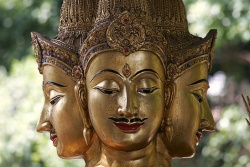Difference between revisions of "The First Abode"
m (1 revision: Adminos 22 sept 12.43PM) |
m (1 revision: Robo text replace 30 sept) |
||
| (One intermediate revision by one other user not shown) | |||
| Line 56: | Line 56: | ||
#Studying the [[merits]] and [[virtues]] of the [[Buddha]] | #Studying the [[merits]] and [[virtues]] of the [[Buddha]] | ||
#{{Wiki|Being}} born before the [[Buddhas]] and accepted into their company | #{{Wiki|Being}} born before the [[Buddhas]] and accepted into their company | ||
| − | #Demonstrating the [[serenity]] and | + | #Demonstrating the [[serenity]] and stillness of [[samadhi]] with ways and means |
#Praising freedom from the [[realm]] of [[Life]] & [[Death]] | #Praising freedom from the [[realm]] of [[Life]] & [[Death]] | ||
#{{Wiki|Being}} a [[refuge]] for [[living beings]] that are [[suffering]] | #{{Wiki|Being}} a [[refuge]] for [[living beings]] that are [[suffering]] | ||
Latest revision as of 17:44, 30 September 2013
1. The Abode that is the Inspiration of the Bodhi (Awakened) Mind
This is the very beginning of the path of enlightenment and the first stage of the Bodhisattva practice. Chih-I listed ten causes for this inspiration:
- Considering various kinds of truths (such as the Four Truths)
- Seeing the various spiritual signs of the Buddha (such as the 32 physical signs)
- Seeing various kinds of spiritual transformations
- Hearing various kinds of teachings
- Traveling to various lands
- Seeing various kinds of multitudes
- Seeing the cultivation of various practices
- Seeing various kinds of extinction
- Seeing various kinds of wrongs
- Seeing others receive various kinds of suffering
Inspiration has two components.
- First there is a revelation, which is an intellectual experience
- Then there is a vow or promise to do something about it, which is an act of resolve.
Having had such an experience one raises up a vow to attain enlightenment. For example, the Four Broad Vows reflect the mercy & compassion of the Four Noble Truths.
The two vows of compassion:
- Living beings are boundless, I vow to spiritually uplift them (Overcoming Suffering)
- Emotional troubles are countless, I vow to eliminate them (Overcoming Origination)
- The doors to the Dharma are limitless, I vow to know them (The Path)
- The path of enlightenment is supreme, I vow to attain it (Extinction)
The Flower Garland Sutra says of this first abode:
"With this vow, one is resolved with the determination to realize the ten kinds of wisdom that are difficult to attain:
- The wisdom of knowing right from wrong
- The wisdom of knowing the consequences of good and evil
- The wisdom of distinguishing sharp and dull spiritual roots (capacities)
- The wisdom of distinguishing the different understandings of truth
- The wisdom of distinguishing the different spiritual realms
- The wisdom of knowing where all paths lead.
- The wisdom of knowing all meditations, emancipations, and samadhis
- The wisdom of knowing of past lives without hesitation
- The wisdom of having the divine eye without hesitation
- The wisdom of ending all of the afflictions (asravas) of the past, the present and the future
Bodhisattvas are encouraged to study these ten things
- Diligently offering service to the Buddhas
- Wishing to remain in the realm of Life & Death to rescue others
- Guiding worldly people so that they stop committing evil deeds
- Always teaching the Dharma with the most subtle truth
- Praising the supreme Dharma
- Studying the merits and virtues of the Buddha
- Being born before the Buddhas and accepted into their company
- Demonstrating the serenity and stillness of samadhi with ways and means
- Praising freedom from the realm of Life & Death
- Being a refuge for living beings that are suffering
This is to make Bodhisattvas broaden their understanding of the Buddha’s teaching so that they grasp what they hear without having to depend upon others to explain it."


